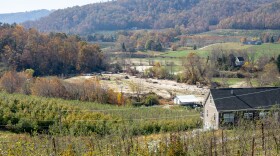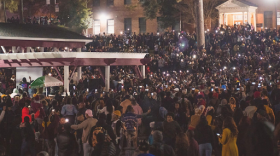Sankofa Farms was originally supposed to be a school garden in which middle school students could get away from the pressures of the classroom and get their hands dirty in the soil. After the proposal was rejected by the school’s principal, middle-school science teacher Kamal Bell made a much bigger investment in the idea.
Bell borrowed money from the U.S. Department of Agriculture and purchased 12 acres of land in Cedar Grove, North Carolina. In 2016 Sankofa Farms and Sankofa Farms Agricultural Academy were born. For Bell, this farm presents an opportunity to tackle many of the challenges faced by inner-city youth. Bell experienced some of these first hand as a child growing up in a food desert in Durham, and he hopes to use Sankofa to provide young teens life skills and the ability to grow their own healthy, nutritious food. Kamal Bell joins host Frank Stasio to talk about his mission for the farm and the obstacles he has faced so far. 16-year-old Kamoni King, a rising junior at Hillside High School in Durham, joins the conversation to share his experience with Bell and what he has learned from life on the farm.
Interview Highlights
Bell on how his mentor tried to dissuade him from farming:
[My mentor said:] You don’t want to go into the industry. You’re going to be a poor farmer. That’s the message I’ve gotten the whole time through this whole journey to the farm. And one thing about me, if people tell me no, I’m going to find a yes. So I didn’t listen to him.

Bell on what inspired him to include students on the farm:
The plan with the youth actually came in when I started teaching in Durham Public Schools, and I saw how students like Kamoni would light up when they had access and they were able to help out with farming activities.
King on how he became interested in farming:
[There] were some chickens in the courtyard, and I was interested in them. We would see them — how they hatch in the incubator — and I was interested in the process and being able to experience how a chicken would grow.
King on the condition of the land when he first saw it:
I was shocked, and I was like: I’m not sure I want to be here because it was tiles for the roof. It was shingles, shotgun shells. It was trash. It was piles, and it was trees. And we had to clean it.
King on a typical day at Sankofa Farms:
Typically we will go inspect the beehives … Then we may go out into the field, probably turn the irrigation on and check on the crops to see if they are germinating or what’s ready to be harvested.
King on selling the produce he helped grow:
It was a game changer, because now I see why I stayed at the farm for four years without getting paid.
King on what he plans to do with his farming skills:
I’m going to build it up and pass it on to family and friends. And try to tell people around the world that land is wealth and wealth is power.
A Closer Look At Sankofa Farms
https://www.youtube.com/watch?v=TOyW8iT5S9s
Note: This program originally aired August 13, 2019.







